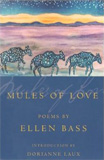Review by Isaiah Vianese
BOA Editions
250 N. Goodman St., Suite 306
Rochester, NY 14607
ISBN 929918224
2002, 90 pp., $13.95
www.boaeditions.org
I first read Ellen Bass’ Mules of Love a few months after I came out of the closet. Beginning my second fall in college, I had decided to seriously pursue writing poetry and to be open about my sexuality—two decisions that were tied for me. So, it makes sense that I turned to poetry for comfort during this very vulnerable period, and comfort is exactly what Bass’ book gave me. Mules of Love is collection about love, family, and empathy told in (mostly) first-person narratives. Bass’ voice in these poems is warm and kind, as she considers how to be caring and gentle.
Many of the poet’s pieces focus on sex. In the first section, “If There Is No God,” she sometimes uses the erotic as a way to understand larger questions about religion, love, and mortality. This use of sex as a lens for viewing grand subjects is best seen in “God and the G-Spot,” during which she ties the supernatural, romantic, and erotic:
God, the G-spot, falling in love. The earth round
and spinning, the galaxies speeding
in the glib flow of the Hubble expansion.
I’m an East Coast Jew. We all have our opinions.
This poem is not about answering questions but about praising the unanswerable. What is fictitious? What is real? What can save us? Bass does not have clear responses, but she commiserates the with her reader’s speculation. She maintains this wonder throughout the first movement of the book.
The second section, “Birds Do It,” is also about love and sex, but the poems here are intimate portraits of romantic relationships. Some of the best pieces, such as “Basket of Figs,” “Sleeping With You,” and “Can’t Get Over Her,” explore the happiness and trials of loving a partner. Most often, Bass praises sexual pleasure and the beauty of the human body. For example, in “Poem to My Sex at Fifty-One,” Bass describes a vulva:
But that fleshy
plum is always cheerful. And new.
A taut globe shining
in an old fruit tree.
This celebration is important because it is an example of a contemporary woman in her fifties owning and extolling the beauty of the aging female body and being sexually empowered—something that still occurs too rarely.
Also—and what was most important to me as a gay teenager first reading this book—the poems in this section reveal the healthy and loving sexual relationships gay couples can have. While I knew such relationships were possible when I first came out, it was reassuring to read poems about a gay person praising her partner, as in “On Seeing Bernini’s Ecstasy of Saint Teresa,” in which the classic statue reminds her of her lover’s beauty and vulnerability. Though it may not be en vogue for poems to proffer hope so transparently these days, this optimism can be of great value to readers. It certainly was to me.
The last two sections of the book also find the poet reaching for hopefulness. In the penultimate, “Tulip Blossoms,” Bass discusses her concerns as a parent. In the poem, “Worry,” she laments, “I have worried/ all over the world. It comes easily,” to which she finds little resolution in the poem, except that such concern is a natural part of her thinking and she must endure. Yet, for all of the worry the poems about parenting explore, they also acknowledge the blessing being a parent can bring; in “For My Daughter on Her Twenty-First Birthday,” the poet confesses: “You dug me out like a well. You lit/ the deadwood of my heart. You pinned me/ to the earth with the points of stars.” Bass praises having children, discussing the experience is an invaluable revelation.
However, the theme of hope reaches greater clarity in the final section, “Insomnia,” during which the poet reaches out directly to the reader to lend her encouragement. She does this best in the remarkable, “The Thing Is,” a poem about facing hardship that concludes:
Then you hold life like a face
between your palms, a plain face,
no charming smile, no violet eyes,
and you say, yes, I will take you
I will love you again.
The collection concludes with perhaps the most buoyant poem, “Insomnia,” which is a Whitman-esque chronicling of people who have trouble falling asleep around the world. Bass ends the poem, again, with encouragement by reaching out to her reader:
So here’s a prayer
for the wakeful, the souls who can’t rest:
As you lie with eyes
open or closed, may something
comfort you—a mockingbird, a breeze, the smell
of crushed mint, Chopin’s Nocturnes,
your child’s birth, a kiss,
or even me—in my chilly kitchen
with my coat over my nightgown—thinking of you.
The poem is a conversation; not only does the reader reach for Bass, but she also reciprocates. It is a powerful way to end the book.
Ellen Bass has continued to write and publish poems since Mules of Love, following it with the collections The Human Line in 2007 and the forthcoming Like a Beggar. While I have enjoyed her continued exploration of love, hope, and compassion in more recent work, Mules of Love holds a special place on my bookshelf. It is a book I return to regularly when I need to be calmed or soothed because it is an openhearted volume of confessional, intimate work that continues to reward my effort. The more the poems reveal, the more endearing they become, and the more I read them, the richer they get.